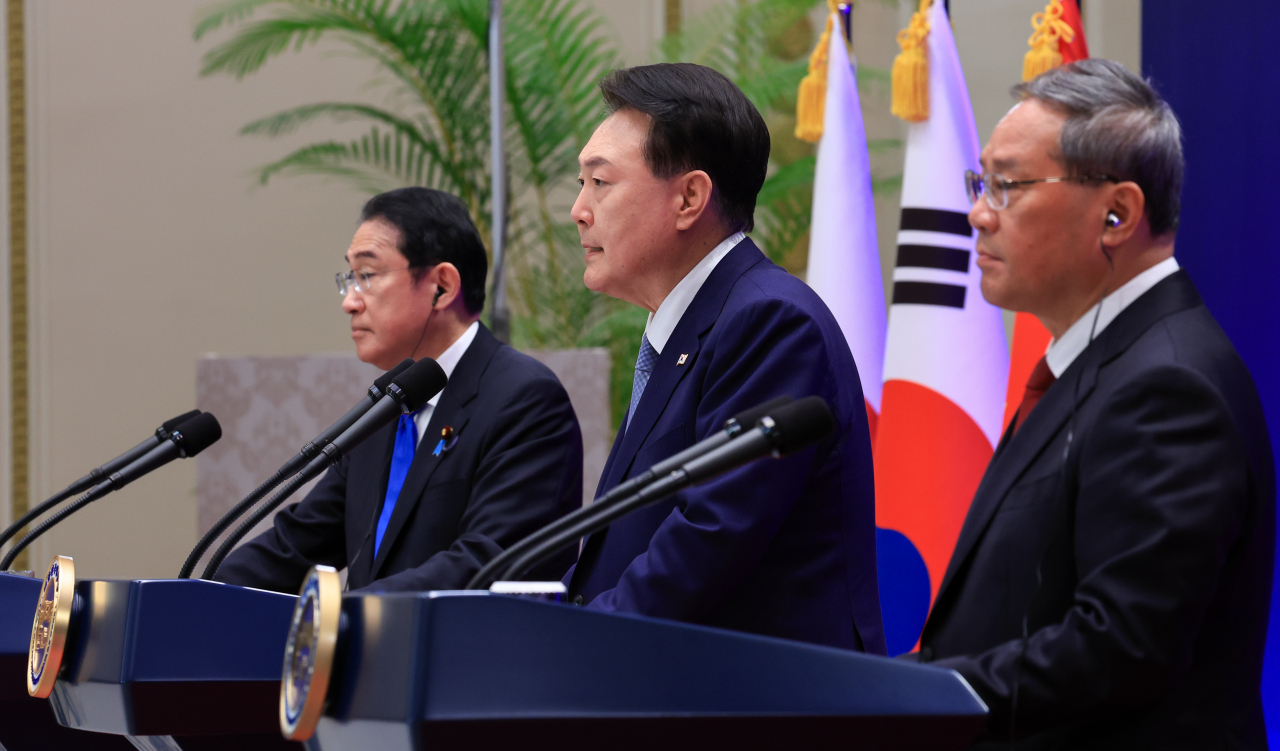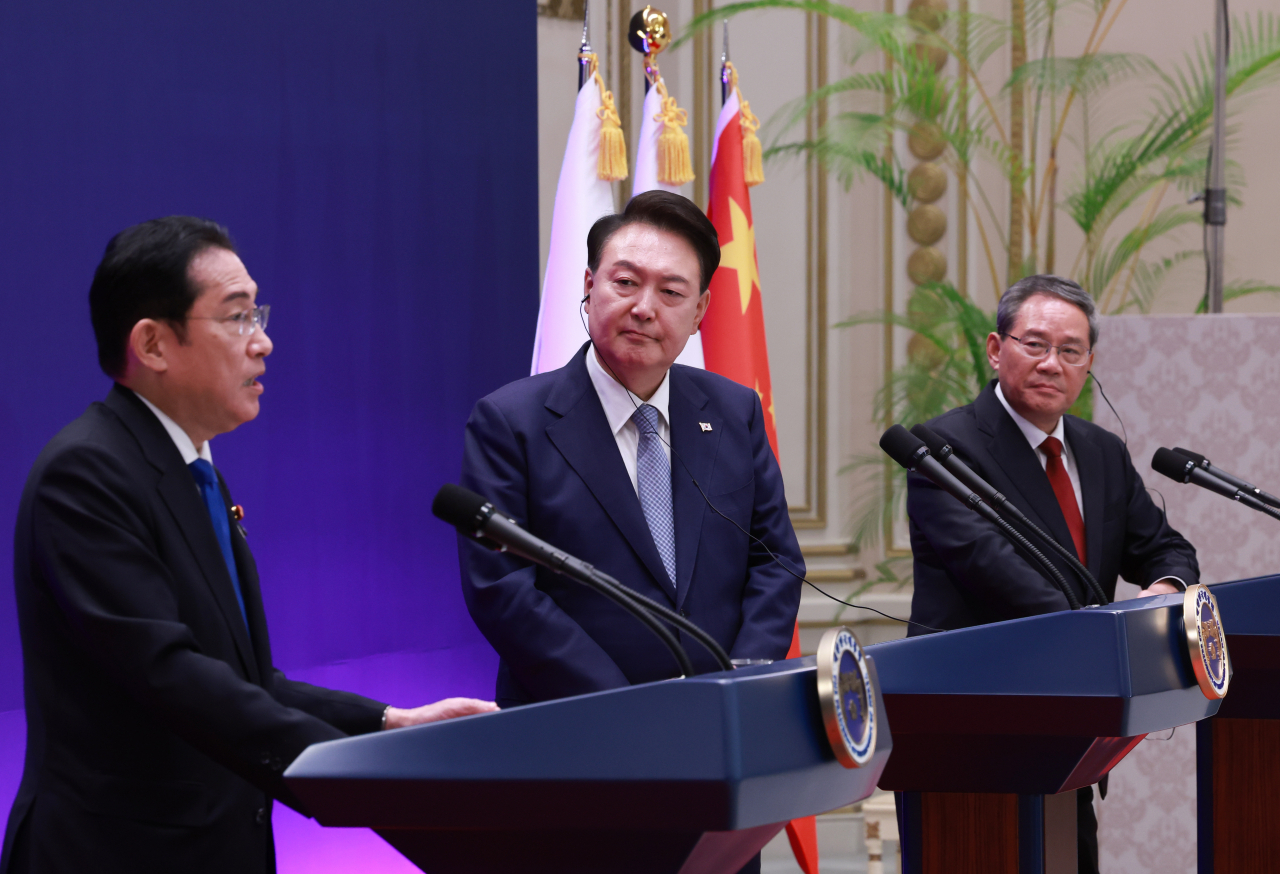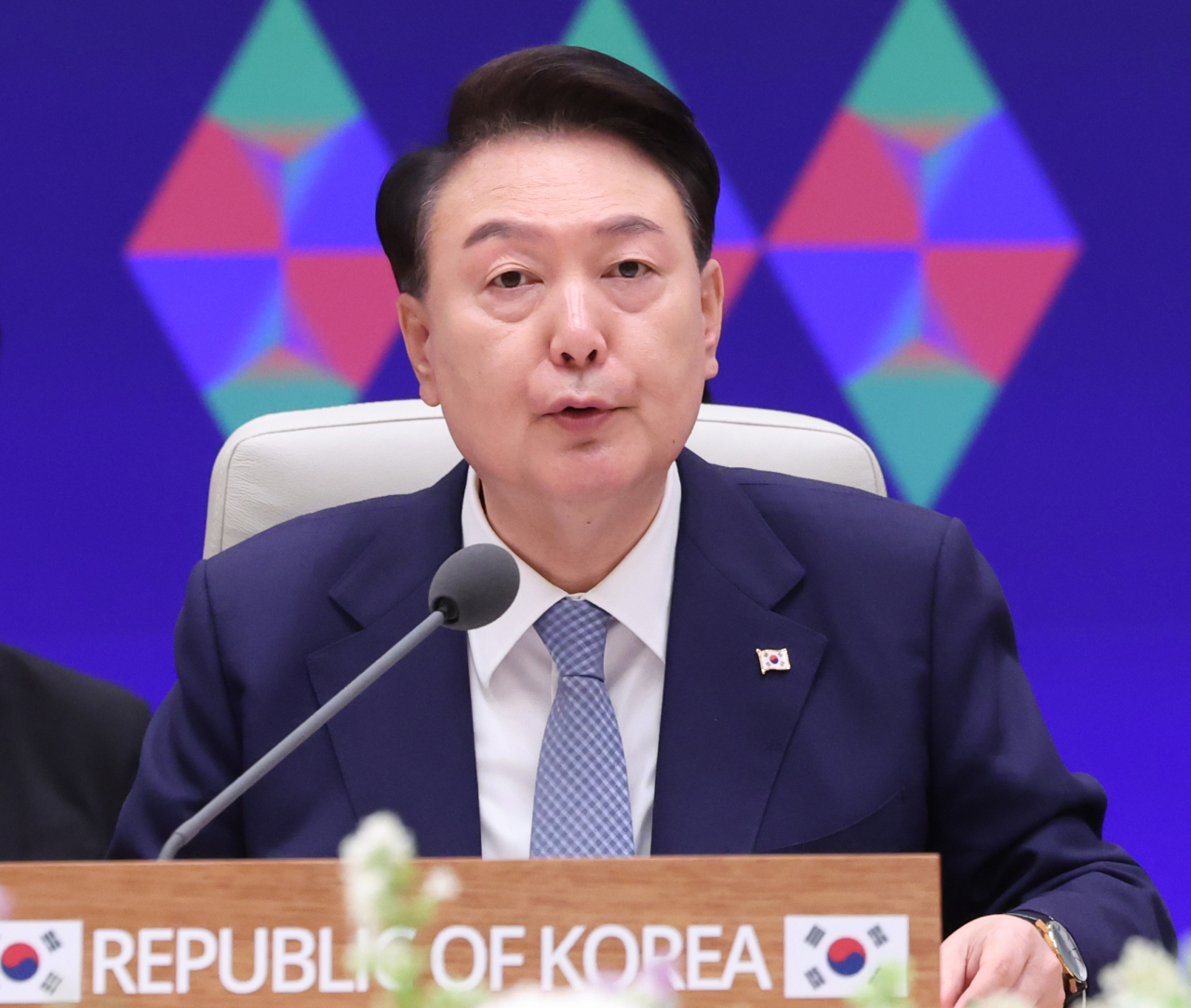Leaders agree to revive 3-way cooperation, reaffirm security efforts
Chinese premier urges stakeholders to exercise restraints over Korean peninsula in 1st trilateral talks in 4 1/2 years
By Son Ji-hyoungPublished : May 27, 2024 - 15:39

Leaders of South Korea, Japan and China reaffirmed Monday that maintaining peace, stability and prosperity on the Korean Peninsula serves their common interest and is their responsibility, amid continued provocations from North Korea that have undermined regional peace in Northeast Asia.
In the first trilateral summit in 4 1/2 years hosted in Seoul, the three countries represented by President Yoon Suk Yeol, Japanese Prime Minister Fumio Kishida and Chinese Premier Li Qiang reiterated their stances on "regional peace and stability, denuclearization of the Korean Peninsula and the abductions issue, respectively," according to a joint statement Monday.
President Yoon, both in the trilateral meeting and the subsequent joint press conference at Cheong Wa Dae, called on the three countries to stem North Korea's provocations jointly, bringing up Pyongyang's notification to Tokyo the same day about launching a new space satellite.
"In order to ensure regional peace and security, which is to the common benefit of all three countries, it is important to achieve a free, peaceful and united Korean Peninsula," Yoon told reporters after the three-way summit.
In the opening remarks of the three-way summit, Yoon also said, "I hope that, as active members of the United Nations Security Council, we the three countries can contribute to global peace and prosperity by gathering wisdom and strength in the face of geopolitical tensions."
Yoon described any attempt by North Korea to launch a military space satellite as "an apparent breach of the United Nations resolution," and urged the international community to take bold action against North Korea's provocation, during the trilateral summit.
Kishida echoed Yoon in urging North Korea to stop its satellite launch plan.
North Korea last launched a space satellite into orbit in November. But South Korea claimed the satellite did not appear to be operational, and the satellite launch breaches UN Security Council sanctions banning North Korea from launching ballistic missiles, out of a belief that North Korea has disguised a test of the ballistic missile technology as a satellite launch.
Kishida added that North Korea's denuclearization and the stabilization of the Korean Peninsula benefit all three countries. He also said Yoon and Li expressed their understanding about solving the Japanese abductee problem in North Korea.

Li, who represented a longtime ally of North Korea, said at the conference that the parties involved should stop the situation on the Korean Peninsula from further escalating.
"I think the relevant parties (on the Korean Peninsula) should exercise restraint," said Li in his remarks translated into Korean, in an apparent reference to the parties concerned, including North Korea. The presidential office declined to clarify what Li had meant by saying "the relevant parties."
"China has always been committed to maintaining peace and stability on the Korean Peninsula," Li also said, and wants to "push forward the process for a political settlement."
According to presidential spokesperson Kim Soo-kyung, Yoon asked Li for China to play a constructive role as a UN Security Council permanent member to ensure nuclear nonproliferation across the world, including in North Korea.
Yoon also sought Li's cooperation on North Korean defector issues, apparently referring to China's forced repatriation of defectors back to the regime. Human rights group North Korean People's Liberation Front estimated that China sent back 2,000 refugees to North Korea between August and September.
Li responded that Beijing was aware of Seoul's concern, adding that he stressed both the peaceful resolution of issues on the Korean Peninsula and regional stability.
This came a day after Yoon, Kishida and Li gathered in Seoul for bilateral talks, respectively. On Sunday, South Korea and China agreed to initiate talks involving their foreign ministers and defense ministers beginning in June, at the summit of Yoon and Li.
According to Yoon's office Sunday, the trilateral talks would "unlikely lead to an uncluttered three-way agreement regarding North Korea issues, the regime's denuclearization and inter-Korean relations."

The three countries also agreed to resume the annual three-way summit, which had been stalled because of the turbulence in the three countries' relationship coupled with the COVID-19 pandemic, with the next rotating chair being Tokyo in 2025.
Achieving regional and international peace and prosperity was one of the key goals laid out in the joint statement following the trilateral summit.
The three countries agreed to carry out projects aimed at people-to-people exchanges; climate change response for sustainable development; economic cooperation and trade; public health and aging society; digital transformation; and disaster relief and safety.
Regional cooperation in and near East Asia will also be at play, on the foundation of the trilateral ties. For example, the three countries agreed to tackle problems arising from yellow dust and sandstorms by trying to collaborate with Mongolia through the Trilateral+X Cooperation framework.
The three countries also agreed to designate 2025 and 2026 as years of cultural exchange between the three countries, in hopes that a total of 40 million people from the three countries combined would travel to one of the other two countries for the purposes of culture, tourism and education by 2030.
"When we faced the unprecedented challenge of the Asian financial crisis in 1997, we opened up a new opportunity for trilateral cooperation," Yoon said in the opening remarks for the three-way summit. "I believe that the many challenges we face today at the regional and global levels can also be transformed into new opportunities to promote communication between the three countries and expand the horizons of cooperation."



















![[Today’s K-pop] Treasure to publish magazine for debut anniversary](http://res.heraldm.com/phpwas/restmb_idxmake.php?idx=642&simg=/content/image/2024/07/26/20240726050551_0.jpg&u=)